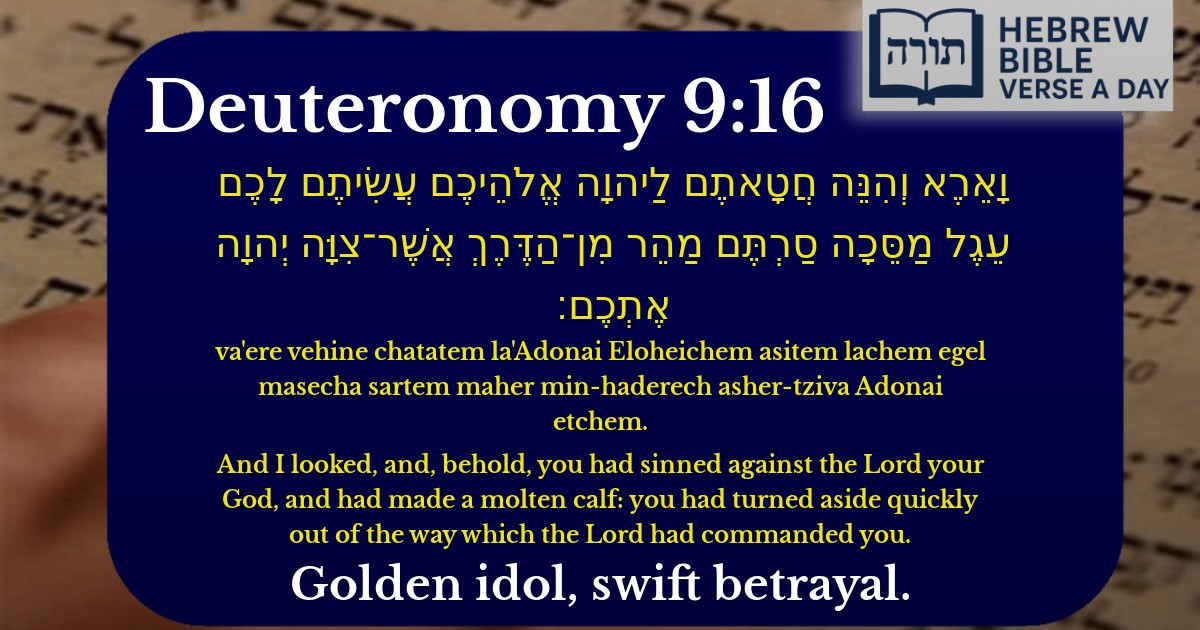Join Our Newsletter To Be Informed When New Videos Are Posted
Join the thousands of fellow Studends who rely on our videos to learn how to read the bible in Hebrew for free!
Hebrew Text
וָאֵרֶא וְהִנֵּה חֲטָאתֶם לַיהוָה אֱלֹהֵיכֶם עֲשִׂיתֶם לָכֶם עֵגֶל מַסֵּכָה סַרְתֶּם מַהֵר מִן־הַדֶּרֶךְ אֲשֶׁר־צִוָּה יְהוָה אֶתְכֶם׃
English Translation
And I looked, and, behold, you had sinned against the Lord your God, and had made a molten calf: you had turned aside quickly out of the way which the Lord had commanded you.
Transliteration
Va'ere vehine chatatem la'Adonai Eloheichem asitem lachem egel masecha sartem maher min-haderech asher-tziva Adonai etchem.
Hebrew Leining Text
וָאֵ֗רֶא וְהִנֵּ֤ה חֲטָאתֶם֙ לַיהֹוָ֣ה אֱלֹֽהֵיכֶ֔ם עֲשִׂיתֶ֣ם לָכֶ֔ם עֵ֖גֶל מַסֵּכָ֑ה סַרְתֶּ֣ם מַהֵ֔ר מִן־הַדֶּ֕רֶךְ אֲשֶׁר־צִוָּ֥ה יְהֹוָ֖ה אֶתְכֶֽם׃
Parasha Commentary
📚 Talmud Citations
This verse is quoted in the Talmud.
📖 Avodah Zarah 54a
The verse is referenced in the context of discussing idolatry and the sin of the golden calf, illustrating how quickly the Israelites turned away from God's commandments.
📖 Sanhedrin 102a
The verse is cited in a discussion about the consequences of idolatry and the golden calf incident, emphasizing the swift deviation from God's path.


The Sin of the Golden Calf
The verse (Devarim 9:16) recounts Moshe's dismay upon witnessing Bnei Yisrael's transgression with the egel maseicha (molten calf). Rashi explains that Moshe emphasizes "וָאֵרֶא" ("and I looked") to indicate that he saw the sin with his own eyes, confirming its severity. The phrase "סַרְתֶּם מַהֵר" ("you turned aside quickly") underscores the shocking haste with which the nation abandoned Hashem's commandments, despite having recently experienced the revelation at Har Sinai.
Spiritual Implications of the Sin
The Rambam (Hilchos Avodah Zarah 1:1) teaches that the golden calf represented a fundamental error in understanding divine worship. Bnei Yisrael sought a physical intermediary to replace Moshe, demonstrating a lapse in their emunah (faith). The Midrash Tanchuma (Ki Sisa 19) elaborates that their impatience and lack of trust in Hashem's providence led them to create an idol, violating the second commandment they had just received.
Lessons from the Incident
Theological Consequences
The Kli Yakar (Devarim 9:16) explains that the molten calf was a "חטאה" (sin) rather than merely an "עוון" (iniquity) because it represented a deliberate rejection of the "דרך אשר צוה ה'" (path commanded by Hashem). This distinction underscores the gravity of abandoning divine instruction for human innovation in avodah (worship).